The Recovery Model and Therapeutic Relationships in Mental Health
VerifiedAdded on 2023/06/07
|8
|1875
|399
Essay
AI Summary
This essay explores the concept of recovery in mental health care, emphasizing its meaning as a hopeful and purposeful life despite the limitations imposed by mental illness. It delves into the individual's perspective on recovery, highlighting the importance of hope, understanding, empowerment, per...
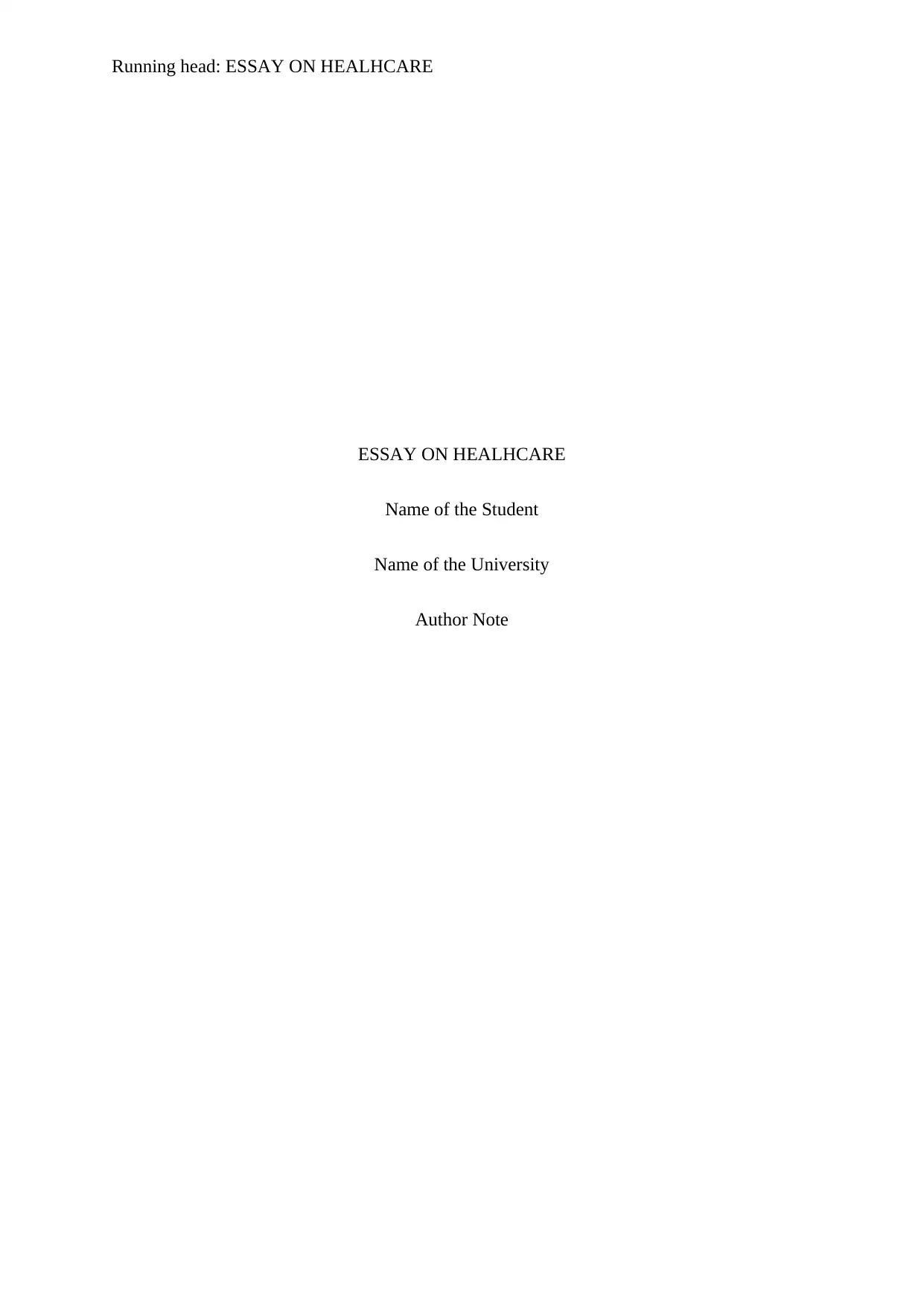
Running head: ESSAY ON HEALHCARE
ESSAY ON HEALHCARE
Name of the Student
Name of the University
Author Note
ESSAY ON HEALHCARE
Name of the Student
Name of the University
Author Note
Paraphrase This Document
Need a fresh take? Get an instant paraphrase of this document with our AI Paraphraser
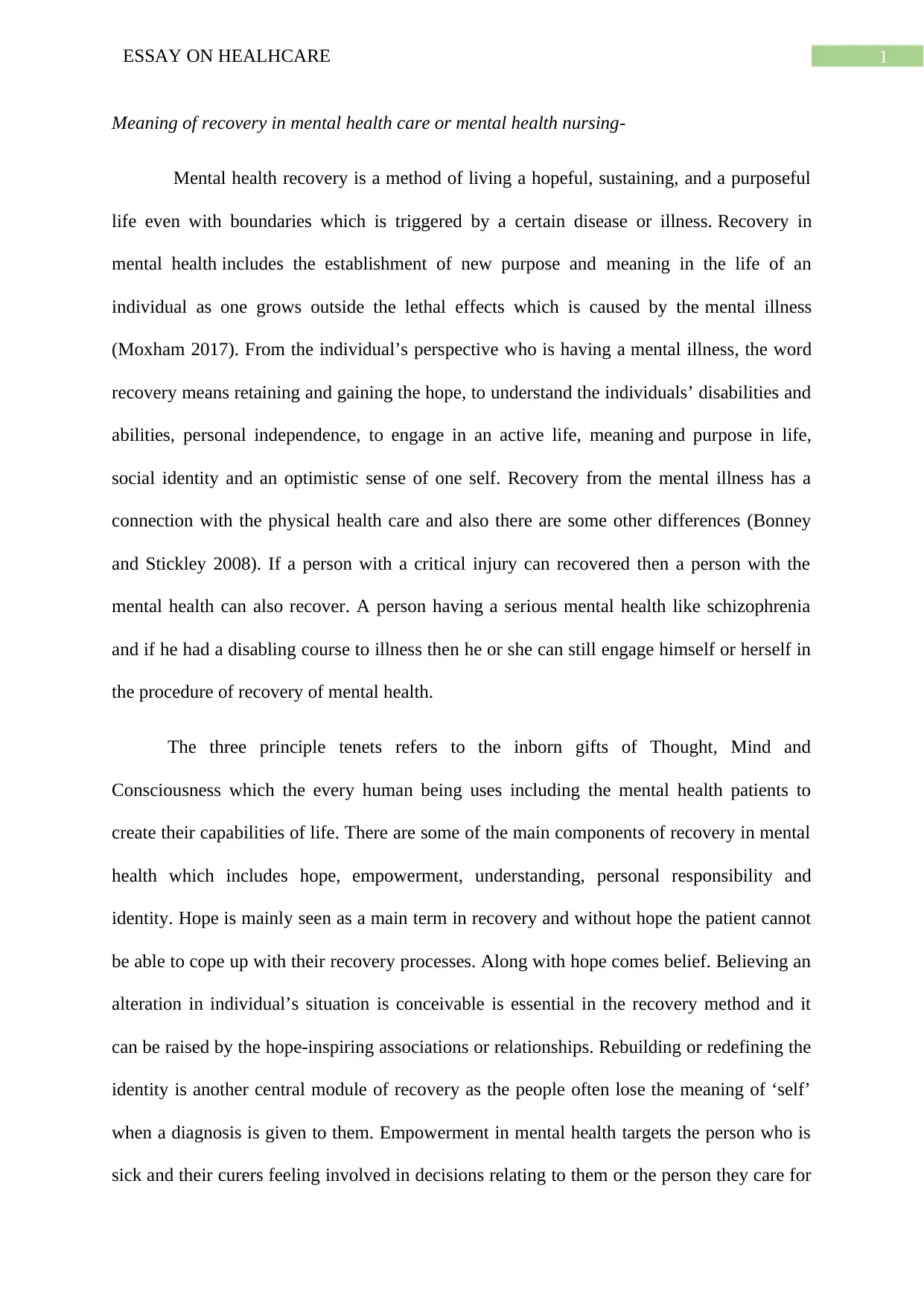
1ESSAY ON HEALHCARE
Meaning of recovery in mental health care or mental health nursing-
Mental health recovery is a method of living a hopeful, sustaining, and a purposeful
life even with boundaries which is triggered by a certain disease or illness. Recovery in
mental health includes the establishment of new purpose and meaning in the life of an
individual as one grows outside the lethal effects which is caused by the mental illness
(Moxham 2017). From the individual’s perspective who is having a mental illness, the word
recovery means retaining and gaining the hope, to understand the individuals’ disabilities and
abilities, personal independence, to engage in an active life, meaning and purpose in life,
social identity and an optimistic sense of one self. Recovery from the mental illness has a
connection with the physical health care and also there are some other differences (Bonney
and Stickley 2008). If a person with a critical injury can recovered then a person with the
mental health can also recover. A person having a serious mental health like schizophrenia
and if he had a disabling course to illness then he or she can still engage himself or herself in
the procedure of recovery of mental health.
The three principle tenets refers to the inborn gifts of Thought, Mind and
Consciousness which the every human being uses including the mental health patients to
create their capabilities of life. There are some of the main components of recovery in mental
health which includes hope, empowerment, understanding, personal responsibility and
identity. Hope is mainly seen as a main term in recovery and without hope the patient cannot
be able to cope up with their recovery processes. Along with hope comes belief. Believing an
alteration in individual’s situation is conceivable is essential in the recovery method and it
can be raised by the hope-inspiring associations or relationships. Rebuilding or redefining the
identity is another central module of recovery as the people often lose the meaning of ‘self’
when a diagnosis is given to them. Empowerment in mental health targets the person who is
sick and their curers feeling involved in decisions relating to them or the person they care for
Meaning of recovery in mental health care or mental health nursing-
Mental health recovery is a method of living a hopeful, sustaining, and a purposeful
life even with boundaries which is triggered by a certain disease or illness. Recovery in
mental health includes the establishment of new purpose and meaning in the life of an
individual as one grows outside the lethal effects which is caused by the mental illness
(Moxham 2017). From the individual’s perspective who is having a mental illness, the word
recovery means retaining and gaining the hope, to understand the individuals’ disabilities and
abilities, personal independence, to engage in an active life, meaning and purpose in life,
social identity and an optimistic sense of one self. Recovery from the mental illness has a
connection with the physical health care and also there are some other differences (Bonney
and Stickley 2008). If a person with a critical injury can recovered then a person with the
mental health can also recover. A person having a serious mental health like schizophrenia
and if he had a disabling course to illness then he or she can still engage himself or herself in
the procedure of recovery of mental health.
The three principle tenets refers to the inborn gifts of Thought, Mind and
Consciousness which the every human being uses including the mental health patients to
create their capabilities of life. There are some of the main components of recovery in mental
health which includes hope, empowerment, understanding, personal responsibility and
identity. Hope is mainly seen as a main term in recovery and without hope the patient cannot
be able to cope up with their recovery processes. Along with hope comes belief. Believing an
alteration in individual’s situation is conceivable is essential in the recovery method and it
can be raised by the hope-inspiring associations or relationships. Rebuilding or redefining the
identity is another central module of recovery as the people often lose the meaning of ‘self’
when a diagnosis is given to them. Empowerment in mental health targets the person who is
sick and their curers feeling involved in decisions relating to them or the person they care for
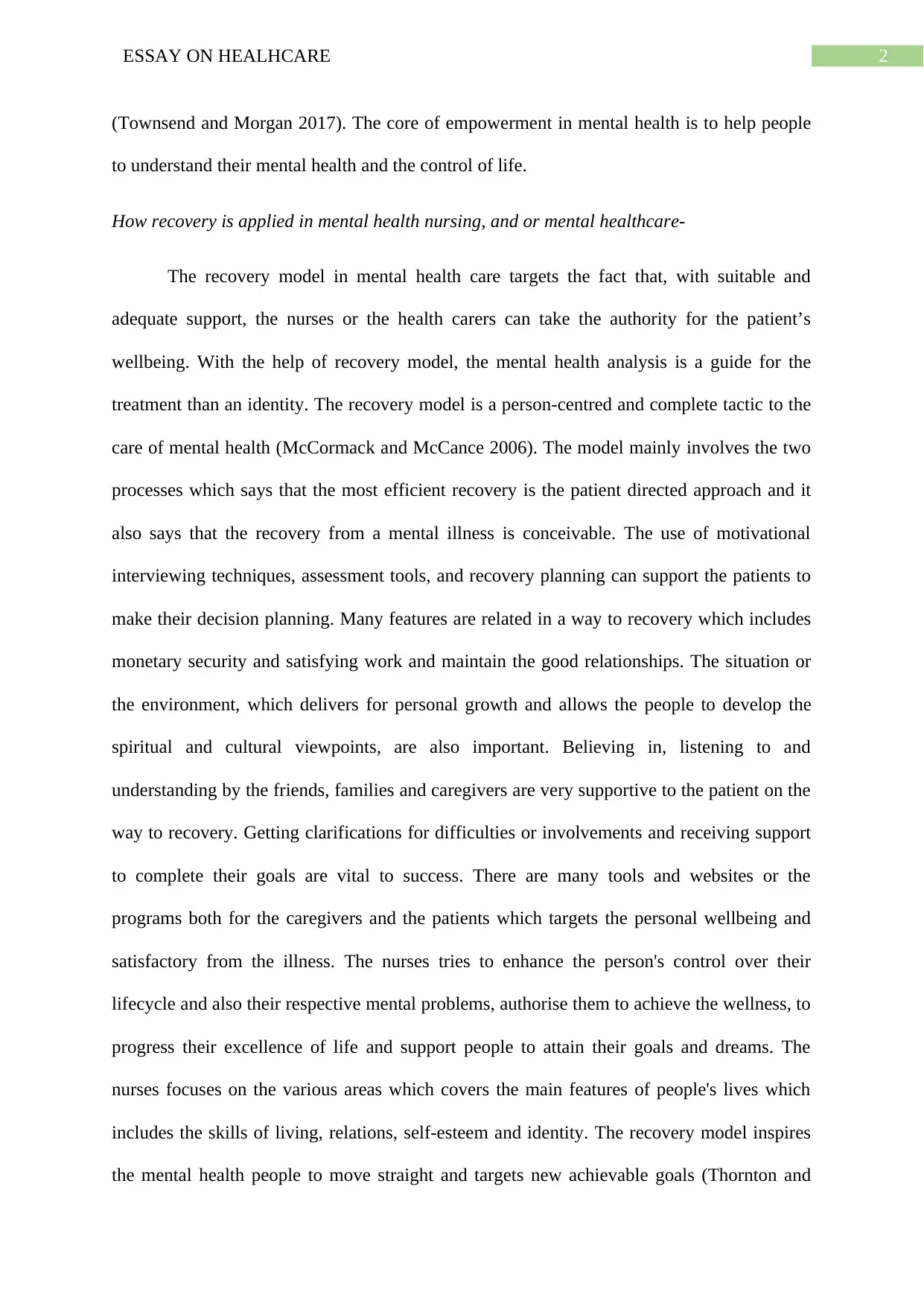
2ESSAY ON HEALHCARE
(Townsend and Morgan 2017). The core of empowerment in mental health is to help people
to understand their mental health and the control of life.
How recovery is applied in mental health nursing, and or mental healthcare-
The recovery model in mental health care targets the fact that, with suitable and
adequate support, the nurses or the health carers can take the authority for the patient’s
wellbeing. With the help of recovery model, the mental health analysis is a guide for the
treatment than an identity. The recovery model is a person-centred and complete tactic to the
care of mental health (McCormack and McCance 2006). The model mainly involves the two
processes which says that the most efficient recovery is the patient directed approach and it
also says that the recovery from a mental illness is conceivable. The use of motivational
interviewing techniques, assessment tools, and recovery planning can support the patients to
make their decision planning. Many features are related in a way to recovery which includes
monetary security and satisfying work and maintain the good relationships. The situation or
the environment, which delivers for personal growth and allows the people to develop the
spiritual and cultural viewpoints, are also important. Believing in, listening to and
understanding by the friends, families and caregivers are very supportive to the patient on the
way to recovery. Getting clarifications for difficulties or involvements and receiving support
to complete their goals are vital to success. There are many tools and websites or the
programs both for the caregivers and the patients which targets the personal wellbeing and
satisfactory from the illness. The nurses tries to enhance the person's control over their
lifecycle and also their respective mental problems, authorise them to achieve the wellness, to
progress their excellence of life and support people to attain their goals and dreams. The
nurses focuses on the various areas which covers the main features of people's lives which
includes the skills of living, relations, self-esteem and identity. The recovery model inspires
the mental health people to move straight and targets new achievable goals (Thornton and
(Townsend and Morgan 2017). The core of empowerment in mental health is to help people
to understand their mental health and the control of life.
How recovery is applied in mental health nursing, and or mental healthcare-
The recovery model in mental health care targets the fact that, with suitable and
adequate support, the nurses or the health carers can take the authority for the patient’s
wellbeing. With the help of recovery model, the mental health analysis is a guide for the
treatment than an identity. The recovery model is a person-centred and complete tactic to the
care of mental health (McCormack and McCance 2006). The model mainly involves the two
processes which says that the most efficient recovery is the patient directed approach and it
also says that the recovery from a mental illness is conceivable. The use of motivational
interviewing techniques, assessment tools, and recovery planning can support the patients to
make their decision planning. Many features are related in a way to recovery which includes
monetary security and satisfying work and maintain the good relationships. The situation or
the environment, which delivers for personal growth and allows the people to develop the
spiritual and cultural viewpoints, are also important. Believing in, listening to and
understanding by the friends, families and caregivers are very supportive to the patient on the
way to recovery. Getting clarifications for difficulties or involvements and receiving support
to complete their goals are vital to success. There are many tools and websites or the
programs both for the caregivers and the patients which targets the personal wellbeing and
satisfactory from the illness. The nurses tries to enhance the person's control over their
lifecycle and also their respective mental problems, authorise them to achieve the wellness, to
progress their excellence of life and support people to attain their goals and dreams. The
nurses focuses on the various areas which covers the main features of people's lives which
includes the skills of living, relations, self-esteem and identity. The recovery model inspires
the mental health people to move straight and targets new achievable goals (Thornton and
⊘ This is a preview!⊘
Do you want full access?
Subscribe today to unlock all pages.

Trusted by 1+ million students worldwide
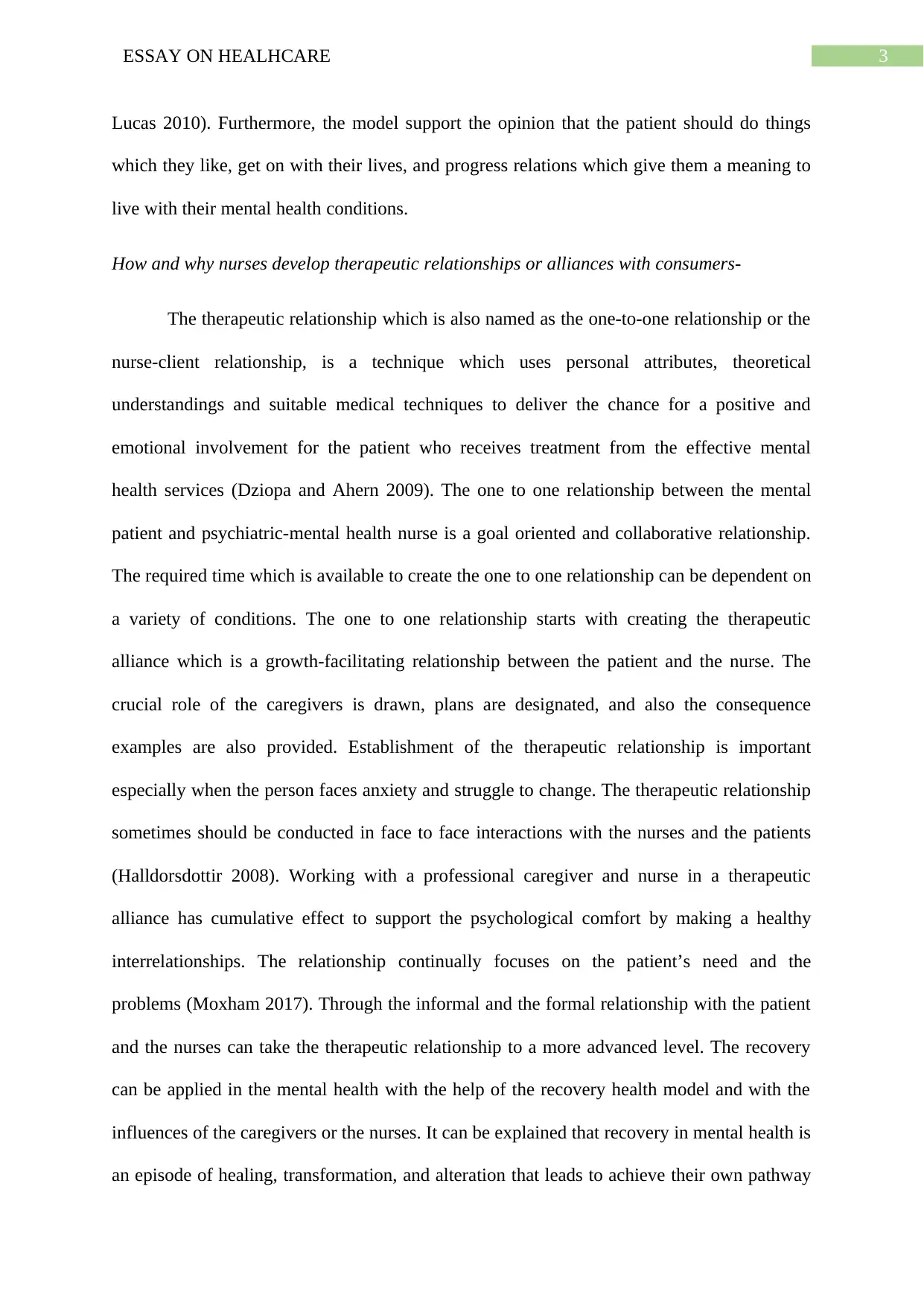
3ESSAY ON HEALHCARE
Lucas 2010). Furthermore, the model support the opinion that the patient should do things
which they like, get on with their lives, and progress relations which give them a meaning to
live with their mental health conditions.
How and why nurses develop therapeutic relationships or alliances with consumers-
The therapeutic relationship which is also named as the one-to-one relationship or the
nurse-client relationship, is a technique which uses personal attributes, theoretical
understandings and suitable medical techniques to deliver the chance for a positive and
emotional involvement for the patient who receives treatment from the effective mental
health services (Dziopa and Ahern 2009). The one to one relationship between the mental
patient and psychiatric-mental health nurse is a goal oriented and collaborative relationship.
The required time which is available to create the one to one relationship can be dependent on
a variety of conditions. The one to one relationship starts with creating the therapeutic
alliance which is a growth-facilitating relationship between the patient and the nurse. The
crucial role of the caregivers is drawn, plans are designated, and also the consequence
examples are also provided. Establishment of the therapeutic relationship is important
especially when the person faces anxiety and struggle to change. The therapeutic relationship
sometimes should be conducted in face to face interactions with the nurses and the patients
(Halldorsdottir 2008). Working with a professional caregiver and nurse in a therapeutic
alliance has cumulative effect to support the psychological comfort by making a healthy
interrelationships. The relationship continually focuses on the patient’s need and the
problems (Moxham 2017). Through the informal and the formal relationship with the patient
and the nurses can take the therapeutic relationship to a more advanced level. The recovery
can be applied in the mental health with the help of the recovery health model and with the
influences of the caregivers or the nurses. It can be explained that recovery in mental health is
an episode of healing, transformation, and alteration that leads to achieve their own pathway
Lucas 2010). Furthermore, the model support the opinion that the patient should do things
which they like, get on with their lives, and progress relations which give them a meaning to
live with their mental health conditions.
How and why nurses develop therapeutic relationships or alliances with consumers-
The therapeutic relationship which is also named as the one-to-one relationship or the
nurse-client relationship, is a technique which uses personal attributes, theoretical
understandings and suitable medical techniques to deliver the chance for a positive and
emotional involvement for the patient who receives treatment from the effective mental
health services (Dziopa and Ahern 2009). The one to one relationship between the mental
patient and psychiatric-mental health nurse is a goal oriented and collaborative relationship.
The required time which is available to create the one to one relationship can be dependent on
a variety of conditions. The one to one relationship starts with creating the therapeutic
alliance which is a growth-facilitating relationship between the patient and the nurse. The
crucial role of the caregivers is drawn, plans are designated, and also the consequence
examples are also provided. Establishment of the therapeutic relationship is important
especially when the person faces anxiety and struggle to change. The therapeutic relationship
sometimes should be conducted in face to face interactions with the nurses and the patients
(Halldorsdottir 2008). Working with a professional caregiver and nurse in a therapeutic
alliance has cumulative effect to support the psychological comfort by making a healthy
interrelationships. The relationship continually focuses on the patient’s need and the
problems (Moxham 2017). Through the informal and the formal relationship with the patient
and the nurses can take the therapeutic relationship to a more advanced level. The recovery
can be applied in the mental health with the help of the recovery health model and with the
influences of the caregivers or the nurses. It can be explained that recovery in mental health is
an episode of healing, transformation, and alteration that leads to achieve their own pathway
Paraphrase This Document
Need a fresh take? Get an instant paraphrase of this document with our AI Paraphraser
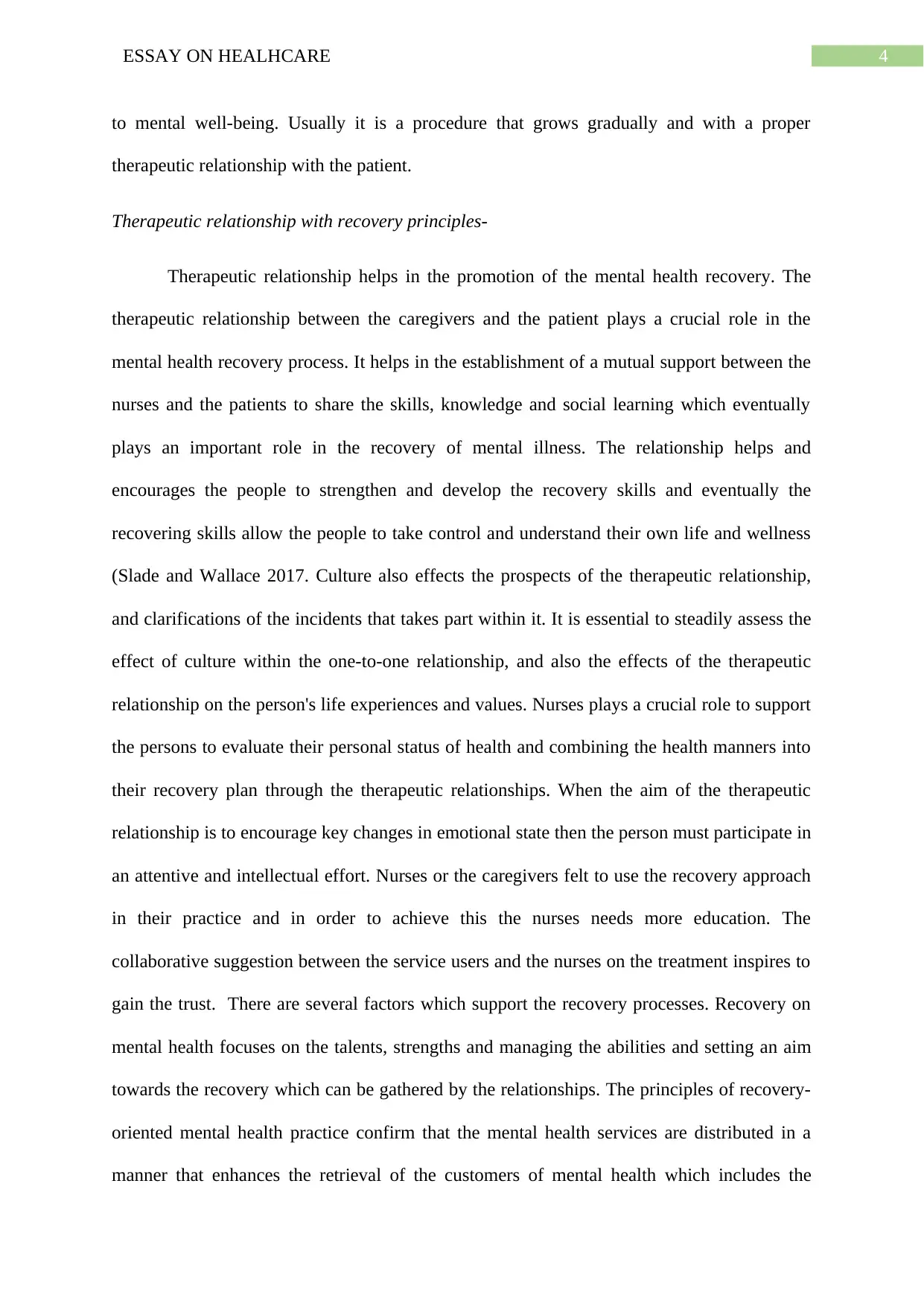
4ESSAY ON HEALHCARE
to mental well-being. Usually it is a procedure that grows gradually and with a proper
therapeutic relationship with the patient.
Therapeutic relationship with recovery principles-
Therapeutic relationship helps in the promotion of the mental health recovery. The
therapeutic relationship between the caregivers and the patient plays a crucial role in the
mental health recovery process. It helps in the establishment of a mutual support between the
nurses and the patients to share the skills, knowledge and social learning which eventually
plays an important role in the recovery of mental illness. The relationship helps and
encourages the people to strengthen and develop the recovery skills and eventually the
recovering skills allow the people to take control and understand their own life and wellness
(Slade and Wallace 2017. Culture also effects the prospects of the therapeutic relationship,
and clarifications of the incidents that takes part within it. It is essential to steadily assess the
effect of culture within the one-to-one relationship, and also the effects of the therapeutic
relationship on the person's life experiences and values. Nurses plays a crucial role to support
the persons to evaluate their personal status of health and combining the health manners into
their recovery plan through the therapeutic relationships. When the aim of the therapeutic
relationship is to encourage key changes in emotional state then the person must participate in
an attentive and intellectual effort. Nurses or the caregivers felt to use the recovery approach
in their practice and in order to achieve this the nurses needs more education. The
collaborative suggestion between the service users and the nurses on the treatment inspires to
gain the trust. There are several factors which support the recovery processes. Recovery on
mental health focuses on the talents, strengths and managing the abilities and setting an aim
towards the recovery which can be gathered by the relationships. The principles of recovery-
oriented mental health practice confirm that the mental health services are distributed in a
manner that enhances the retrieval of the customers of mental health which includes the
to mental well-being. Usually it is a procedure that grows gradually and with a proper
therapeutic relationship with the patient.
Therapeutic relationship with recovery principles-
Therapeutic relationship helps in the promotion of the mental health recovery. The
therapeutic relationship between the caregivers and the patient plays a crucial role in the
mental health recovery process. It helps in the establishment of a mutual support between the
nurses and the patients to share the skills, knowledge and social learning which eventually
plays an important role in the recovery of mental illness. The relationship helps and
encourages the people to strengthen and develop the recovery skills and eventually the
recovering skills allow the people to take control and understand their own life and wellness
(Slade and Wallace 2017. Culture also effects the prospects of the therapeutic relationship,
and clarifications of the incidents that takes part within it. It is essential to steadily assess the
effect of culture within the one-to-one relationship, and also the effects of the therapeutic
relationship on the person's life experiences and values. Nurses plays a crucial role to support
the persons to evaluate their personal status of health and combining the health manners into
their recovery plan through the therapeutic relationships. When the aim of the therapeutic
relationship is to encourage key changes in emotional state then the person must participate in
an attentive and intellectual effort. Nurses or the caregivers felt to use the recovery approach
in their practice and in order to achieve this the nurses needs more education. The
collaborative suggestion between the service users and the nurses on the treatment inspires to
gain the trust. There are several factors which support the recovery processes. Recovery on
mental health focuses on the talents, strengths and managing the abilities and setting an aim
towards the recovery which can be gathered by the relationships. The principles of recovery-
oriented mental health practice confirm that the mental health services are distributed in a
manner that enhances the retrieval of the customers of mental health which includes the
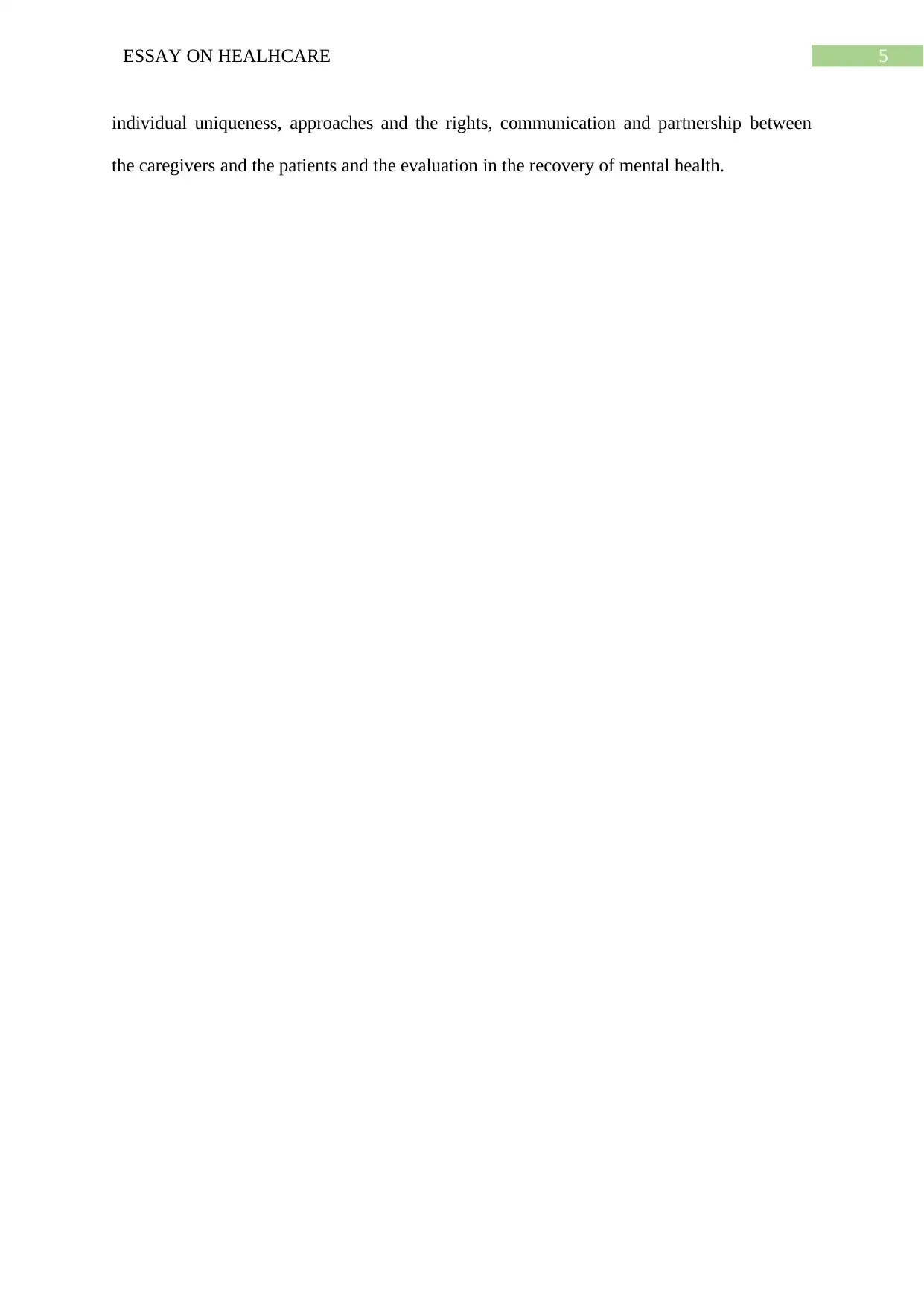
5ESSAY ON HEALHCARE
individual uniqueness, approaches and the rights, communication and partnership between
the caregivers and the patients and the evaluation in the recovery of mental health.
individual uniqueness, approaches and the rights, communication and partnership between
the caregivers and the patients and the evaluation in the recovery of mental health.
⊘ This is a preview!⊘
Do you want full access?
Subscribe today to unlock all pages.

Trusted by 1+ million students worldwide
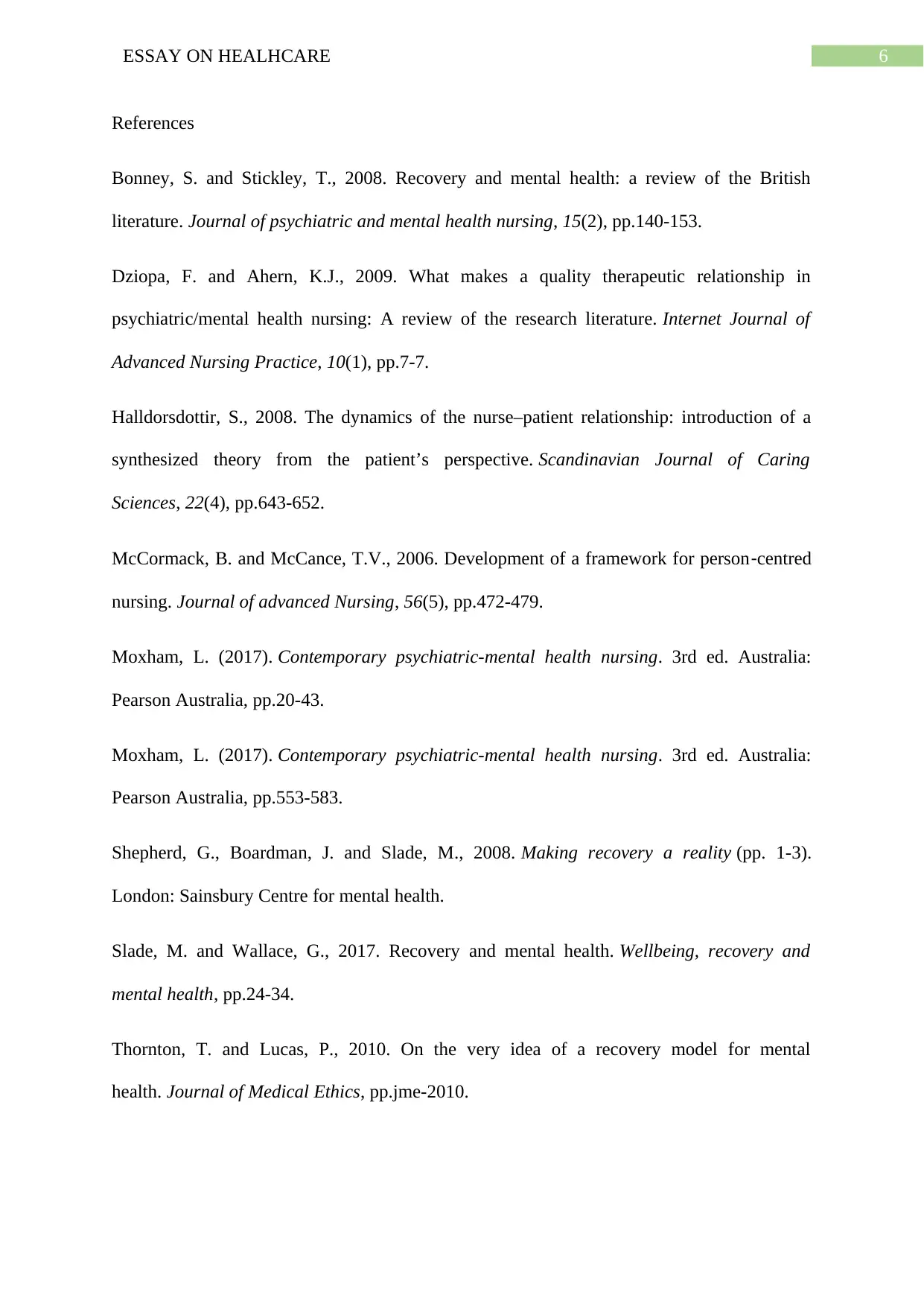
6ESSAY ON HEALHCARE
References
Bonney, S. and Stickley, T., 2008. Recovery and mental health: a review of the British
literature. Journal of psychiatric and mental health nursing, 15(2), pp.140-153.
Dziopa, F. and Ahern, K.J., 2009. What makes a quality therapeutic relationship in
psychiatric/mental health nursing: A review of the research literature. Internet Journal of
Advanced Nursing Practice, 10(1), pp.7-7.
Halldorsdottir, S., 2008. The dynamics of the nurse–patient relationship: introduction of a
synthesized theory from the patient’s perspective. Scandinavian Journal of Caring
Sciences, 22(4), pp.643-652.
McCormack, B. and McCance, T.V., 2006. Development of a framework for person‐centred
nursing. Journal of advanced Nursing, 56(5), pp.472-479.
Moxham, L. (2017). Contemporary psychiatric-mental health nursing. 3rd ed. Australia:
Pearson Australia, pp.20-43.
Moxham, L. (2017). Contemporary psychiatric-mental health nursing. 3rd ed. Australia:
Pearson Australia, pp.553-583.
Shepherd, G., Boardman, J. and Slade, M., 2008. Making recovery a reality (pp. 1-3).
London: Sainsbury Centre for mental health.
Slade, M. and Wallace, G., 2017. Recovery and mental health. Wellbeing, recovery and
mental health, pp.24-34.
Thornton, T. and Lucas, P., 2010. On the very idea of a recovery model for mental
health. Journal of Medical Ethics, pp.jme-2010.
References
Bonney, S. and Stickley, T., 2008. Recovery and mental health: a review of the British
literature. Journal of psychiatric and mental health nursing, 15(2), pp.140-153.
Dziopa, F. and Ahern, K.J., 2009. What makes a quality therapeutic relationship in
psychiatric/mental health nursing: A review of the research literature. Internet Journal of
Advanced Nursing Practice, 10(1), pp.7-7.
Halldorsdottir, S., 2008. The dynamics of the nurse–patient relationship: introduction of a
synthesized theory from the patient’s perspective. Scandinavian Journal of Caring
Sciences, 22(4), pp.643-652.
McCormack, B. and McCance, T.V., 2006. Development of a framework for person‐centred
nursing. Journal of advanced Nursing, 56(5), pp.472-479.
Moxham, L. (2017). Contemporary psychiatric-mental health nursing. 3rd ed. Australia:
Pearson Australia, pp.20-43.
Moxham, L. (2017). Contemporary psychiatric-mental health nursing. 3rd ed. Australia:
Pearson Australia, pp.553-583.
Shepherd, G., Boardman, J. and Slade, M., 2008. Making recovery a reality (pp. 1-3).
London: Sainsbury Centre for mental health.
Slade, M. and Wallace, G., 2017. Recovery and mental health. Wellbeing, recovery and
mental health, pp.24-34.
Thornton, T. and Lucas, P., 2010. On the very idea of a recovery model for mental
health. Journal of Medical Ethics, pp.jme-2010.
Paraphrase This Document
Need a fresh take? Get an instant paraphrase of this document with our AI Paraphraser
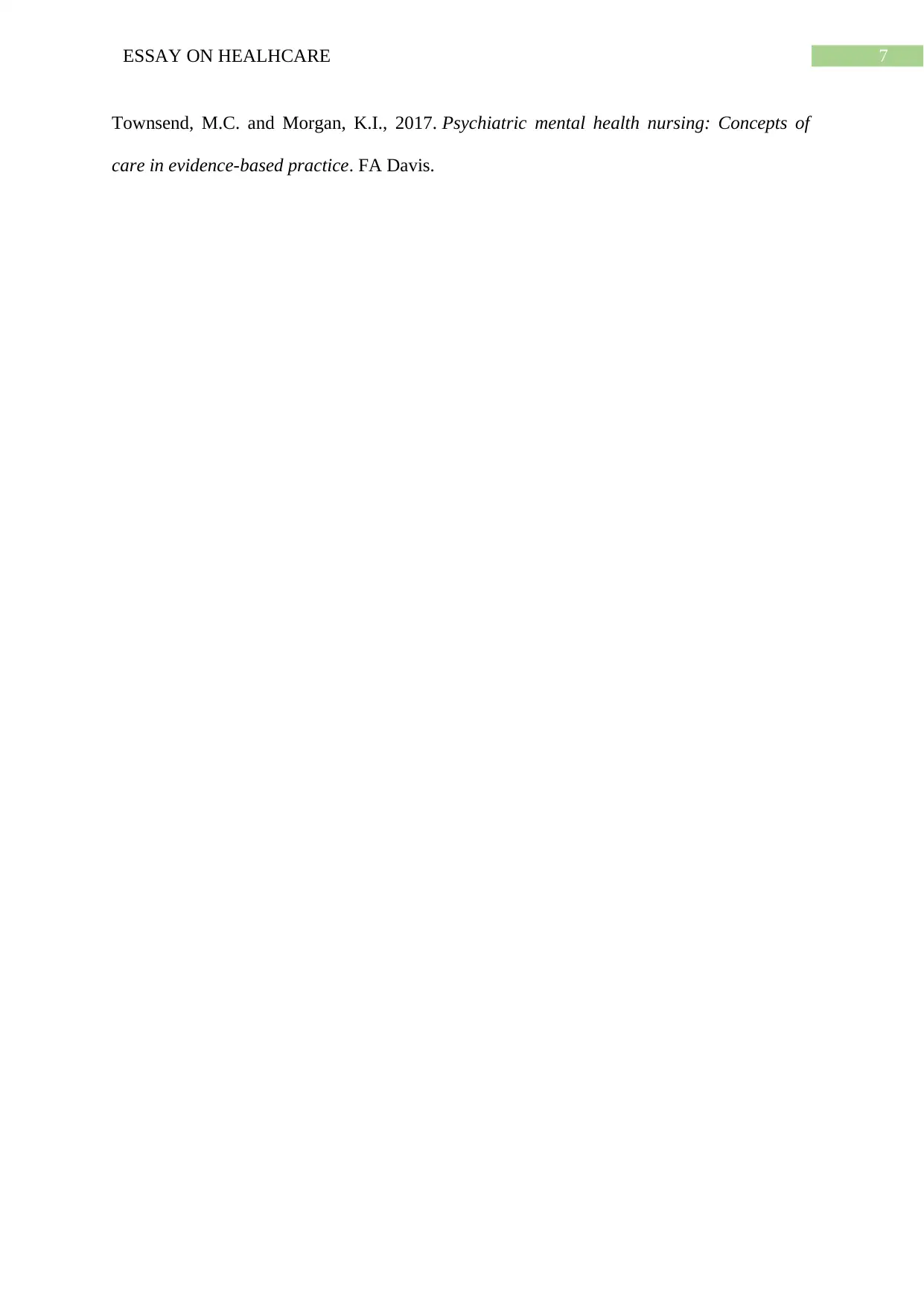
7ESSAY ON HEALHCARE
Townsend, M.C. and Morgan, K.I., 2017. Psychiatric mental health nursing: Concepts of
care in evidence-based practice. FA Davis.
Townsend, M.C. and Morgan, K.I., 2017. Psychiatric mental health nursing: Concepts of
care in evidence-based practice. FA Davis.
1 out of 8
Related Documents
Your All-in-One AI-Powered Toolkit for Academic Success.
+13062052269
info@desklib.com
Available 24*7 on WhatsApp / Email
![[object Object]](/_next/static/media/star-bottom.7253800d.svg)
Unlock your academic potential
© 2024 | Zucol Services PVT LTD | All rights reserved.





